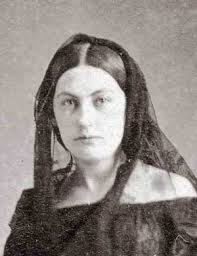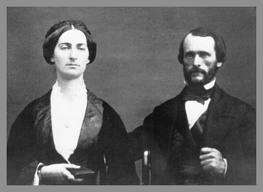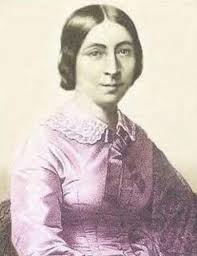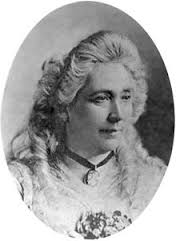 Fremont’s Chief of Staff, Jessie Benton Fremont, was not only his Brilliant and Beautiful Bride, but her political savvy and contacts would save her husband’s career on several occasions. Her father, Thomas Hart Benton’s greatest asset was undoubtedly his beautiful, intelligent and socially popular daughter, Jessie. After a whirl-wind courtship and marriage, Jessie Benton Fremont became her husband’s greatest advocate, promoting his exploits and potential throughout her many spheres of influence. Between Jessie and her Senator father, Fremont’s name became synonymous with intellectual, military and political genius. John C. Fremont’s military adventures in California resulted in a court-martial, where he was convicted of mutiny and misconduct and was dishonorably discharged. President Polk, a friend and ally of Senator Benton, quickly commuted the discharge, thus saving, Jessie and John’s reputation and future.
Fremont’s Chief of Staff, Jessie Benton Fremont, was not only his Brilliant and Beautiful Bride, but her political savvy and contacts would save her husband’s career on several occasions. Her father, Thomas Hart Benton’s greatest asset was undoubtedly his beautiful, intelligent and socially popular daughter, Jessie. After a whirl-wind courtship and marriage, Jessie Benton Fremont became her husband’s greatest advocate, promoting his exploits and potential throughout her many spheres of influence. Between Jessie and her Senator father, Fremont’s name became synonymous with intellectual, military and political genius. John C. Fremont’s military adventures in California resulted in a court-martial, where he was convicted of mutiny and misconduct and was dishonorably discharged. President Polk, a friend and ally of Senator Benton, quickly commuted the discharge, thus saving, Jessie and John’s reputation and future.
 Jessie was born on May 31, 1824 in Cherry Grove, Virginia, the daughter of Thomas Hart and Elizabeth McDowell Benton. By the time she was five years old, Jessie was living in the Nation’s capital. She absorbed her early education from her father, a senator from Missouri who was renowned as the Great Expansionist. Senator Benton shared with her the wonderland of books and maps in the valise that always accompanied him on their trips to and from Missouri and Virginia. She began, too, to share his dream of a nation stretching from ocean to ocean.
Jessie was born on May 31, 1824 in Cherry Grove, Virginia, the daughter of Thomas Hart and Elizabeth McDowell Benton. By the time she was five years old, Jessie was living in the Nation’s capital. She absorbed her early education from her father, a senator from Missouri who was renowned as the Great Expansionist. Senator Benton shared with her the wonderland of books and maps in the valise that always accompanied him on their trips to and from Missouri and Virginia. She began, too, to share his dream of a nation stretching from ocean to ocean.
After attaining some fluency in French and Spanish, Jessie helped in the translation of government documents. In 1838 the Bentons decided that the rambunctious Jessie needed the discipline of a fashionable girls’ school and she was enrolled at Miss English’s Female Seminary near Washington, D.C. She despised the school, mostly because of the class discrimination she observed there.
 Seventeen-year-old Jessie was studying and living at Georgetown Seminary when she met and fell in love with Lieutenant John C. Fremont, who was ten years her senior. Senator Benton became acquainted with John Charles Fremont, a young topographical engineer who shared similar expansionist dreams, and introduced him into the Fremont home. Fremont escorted Jessie’s older sister, Liz, to a school concert where he saw Jessie and fell in love at first sight. The couple eloped and were married on October 19, 1841. Senator Benton was so disappointed that he became estranged for a time from his daughter. For a while after their marriage, Jessie and her husband lived on army posts. Senator Benton was persuaded by his ailing wife to accept the marriage, and a reconciliation occurred between Jessie and her father. The Fremonts then moved into the Benton home.
Seventeen-year-old Jessie was studying and living at Georgetown Seminary when she met and fell in love with Lieutenant John C. Fremont, who was ten years her senior. Senator Benton became acquainted with John Charles Fremont, a young topographical engineer who shared similar expansionist dreams, and introduced him into the Fremont home. Fremont escorted Jessie’s older sister, Liz, to a school concert where he saw Jessie and fell in love at first sight. The couple eloped and were married on October 19, 1841. Senator Benton was so disappointed that he became estranged for a time from his daughter. For a while after their marriage, Jessie and her husband lived on army posts. Senator Benton was persuaded by his ailing wife to accept the marriage, and a reconciliation occurred between Jessie and her father. The Fremonts then moved into the Benton home.
In order to further his father-in-law’s dream of Manifest Destiny, Fremont continued exploring the west and his wife Jessie would compile his reports extolling his bravery and the opportunities of westward expansion. After a confrontation over military command in California, that nearly cost Fremont his career, he and his wife relocated to California, where a short tenure as Senator, brought the young politician to national attention. In 1856, John C. Fremont, as an abolitionist, became the first Republican candidate for President. He lost the election to James Buchanan and even his father-in-law, Senator Benton didn’t support his candidacy.
Early in the Civil War, as Commander of the West, General Fremont, declared martial law in Missouri. His dictatorial attitude and grandiosity didn’t endear him to the politically divided residents of the state. Early in August of 1861, Fremont made a career altering political blunder, he issued an Emancipation Proclamation, freeing all the slaves in the state of Missouri.
 President Lincoln had been walking a fine line, keeping the border states and their citizens from joining the Confederacy. Lincoln’s diplomacy in Missouri was critical to the overall success of the Union cause. Fremont’s unilateral dictate, overstepped his authority and the President immediately dispatched an envoy to Missouri to instruct the Commander in St. Louis to modify the Proclamation. Fremont, defiantly, refused to countermand the edict and Lincoln instantly relieved him from command, replacing “The Pathfinder”, with General Hunter.
President Lincoln had been walking a fine line, keeping the border states and their citizens from joining the Confederacy. Lincoln’s diplomacy in Missouri was critical to the overall success of the Union cause. Fremont’s unilateral dictate, overstepped his authority and the President immediately dispatched an envoy to Missouri to instruct the Commander in St. Louis to modify the Proclamation. Fremont, defiantly, refused to countermand the edict and Lincoln instantly relieved him from command, replacing “The Pathfinder”, with General Hunter.
Fremont’s wife Jessie, was indignant at her husband’s humiliation. She traveled to Washington, on the earliest train, arriving after midnight and demanded an immediate audience with the President. Lincoln dressed and granted, Fremont’s official “Chief of Staff“, her interview. Jessie Benton Fremont flew into a berating of Lincoln, accusing him of sending a spy to pry into her husband’s affairs and threatening that if John C. Fremont wished, he could set up a government for himself.
President Lincoln whose patience was one of his better virtues, listened to all of Jessie Benton Fremont’s harangue and slanders, bid her goodnight and thanked her for visiting and related, at a later date,
“I had to exercise all the rude tact I have to avoid quarreling with her.”
Following the War, they retreated to Pocoho on the Hudson River near Tarrytown, New York. In the financial panic of 1873, Fremont, who had invested heavily in railroad stock, lost everything and the family moved to New York City where they were supported by the money Jessie earned from her published articles and stories in popular magazines.
In 1878 President Hayes appointed Fremont as the 5th Territorial Governor of Arizona.
 Jessie, with her daughter Lily, her son Frank, her Irish maid Mary, her cook Ah Chung, and a dog named Thor, arrived in Prescott on October 6, 1878. Jessie stayed only one year, using the effect of the high altitude on her health as an excuse, moved to New York City where she was in constant correspondence not only with her daughter and husband, but with officials in Washington, D.C. She was joined in New York by her husband and daughter in 1881 when Fremont resigned as territorial governor.
Jessie, with her daughter Lily, her son Frank, her Irish maid Mary, her cook Ah Chung, and a dog named Thor, arrived in Prescott on October 6, 1878. Jessie stayed only one year, using the effect of the high altitude on her health as an excuse, moved to New York City where she was in constant correspondence not only with her daughter and husband, but with officials in Washington, D.C. She was joined in New York by her husband and daughter in 1881 when Fremont resigned as territorial governor.
They decided to move back to California and Jessie and Lily were in Los Angeles when she learned of her husband’s death on July 28, 1890 in New York City. The next July the two ladies moved into a house built for them in Los Angeles by a committee of California women. There Jessie died on December 27, 1902. She was cremated and buried in Los Angeles at Angelus Rosedale Cemetery.
John C. Fremont’s Chief of Staff, Jessie B. Fremont, was not only Brilliant and Beautiful, but had the tenacity and mental wherewithal to perservere, even when her egotistical and self centered husband failed at most of his grandiose enterprises.
Bummer


I met her years ago through the book, “:Immortal Wife’ by Irving Stone. She was everything this article implies. Admirable woman
Betty,
Thanks for the read! Sure could appreciate the “Chief of Staff” more than the General. She could definitely give some of the politicos a run for their money in today’s government climate. Thanks again!
Bummer
Great post about a fascinating lady. Jessie Fremont is one of those women who, were she alive today, would have been a politician in her own right. She obviously was a better one than her husband.
Louis,
Jessie Fremont could sure outshine her husband. She wore the pants and made the decisions in that family. One of Bummer’s favorites. Thanks for the read!
Bummer